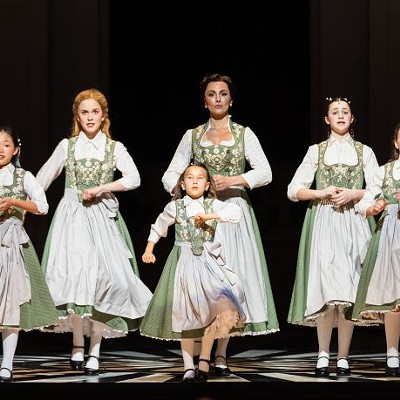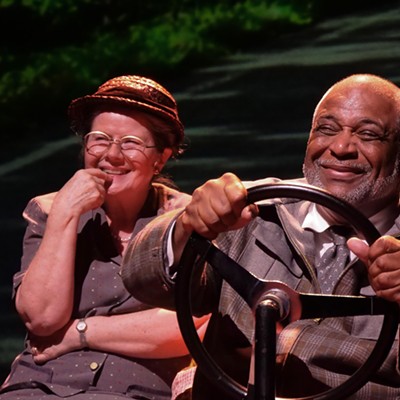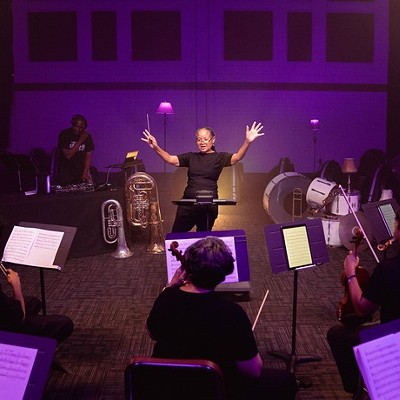Alasdair Stuart over at Sci Find recently did an amazing article that looked at Doctor Who as if the show had always featured a female Doctor throughout its history rather than the male one we have all come to know and love. It's a fantastically deep work of pop culture what if, and I highly recommend you go check it out.
It also got me thinking. The Doctor's sex is one of his defining characteristics, as Stuart points out, but his Britishness is also a major factor. If the 1996 movie showed us anything it's that very few good things happen when you get Americans too involved in Doctor Who. Hell, the only good thing about it was The Doctor himself, the very British Paul McGann.
But what if it had always been an American institution? With the 50th Anniversary so close, what would it be like to remember the the Doctor as played by...
1st Doctor - Buster Crabbe (1963 - 1966)
In the early 1960s Rod Serling had a critical success with The Twilight Zone, but the show remained always on the brink of cancellation, even going over it at times. Burnt out from the struggle of fighting for the show's survival, he decided to move on to a new project called Doctor Who about a time traveler who would fight monsters in the past, present, and future both on Earth and off. CBS reluctantly agreed to give the program a shot.
Serling convinced Buster Crabbe, the aging star of Flash Gordon and Buck Rogers, that he had one more hero in him. Crabbe agreed, and his portrayal of The Doctor as a deceptively powerful older man made him a hero grandfather to children almost instantly, as well a big hit for CBS. The First Doctor gave Crabbe the chance to show off acting chops he had never had before, and while he still threw the occasional punch and ran from the menacing Daleks, more often he thought his way out of situations and offered an occasional darker take than his youthful roles. When Serling departed the show as producer in 1966, Crabbe allowed his contract to expire as well. He died only a month after filming scenes for the show's 20th anniversary special, which was dedicated to his memory.
2nd Doctor - Paul Lynde (1966 - 1969)
Crabbe's refusal to re-sign a contract left Doctor Who with a problem. How do you have Doctor Who with no Doctor? An off-hand remark by Crabbe that a time travel might "age in reverse" upon death became a core staple of the series when he regenerated into Paul Lynde. The exuberant and swishing musical and variety show star was a stark contrast to Crabbe's more solid take, but was all the more engaging to the young audiences that made Doctor Who such a hit.
Though he was oft-times buffoonish, with little of Crabbe's poise and grace, Lynde used comedy as a mask for deeper plans... a mask that he dropped with cold determination whenever he faced the Cybermen who killed the First Doctor. He voluntarily left the role after three seasons to return to better paying and less demanding character work.
3rd Doctor - Robert Stack (1970 - 1974)
The star of The Untouchables was approached to take over for Lynde. Stack was looking to get away from crime drama, and admitted to secretly being a big fan of science fiction and bizarre phenomenon when cast. Nonetheless, his Doctor carried over many of the traits of Elliot Ness to the point that some accused him of not trying to differentiate the two very much.
The Third Doctor, while stranded on Earth following the death of The Second, was confined to a branch of the United States military as science adviser. Stack had the luck to work with Dalton Trumbo, who penned many great scripts dealing with leftover sentiments from his time blacklisted after refusing to testify to the House Un-American Activities Committee. This led to Stack facing off against Frank Sutton as The Commander, an evil high-ranking military officer who was secretly a fellow Time Lord in disguise. The social commentary against military force became a recurring theme of the series.
Stack moved on in 1974. He left behind an action-packed legacy of daring feats, and would make many allusions to his time as he hosted the series, Unsolved Mysteries.
4th Doctor - Alan Alda (1974 - 1981)
In 1972 Alan Alda auditioned for the role of Hawkeye Pierce in the television adaptation of M*A*S*H, but heard a rumor that on the lot next door they were filming an episode of Doctor Who. He sneaked on set and struck up a conversation with Stack that eventually led him to becoming the Fourth Doctor for an astounding seven years. Alda turned the Time Lord into more alien figure, both swashbuckling and incredibly comedic under his collection of increasingly ridiculous hats.
Alda would go on to write and direct many episodes of the show, and thus steered the character more than any actor before or since. He established much of the show's mythology surrounding Gallifrey, and is still considered the definitive Doctor by many of the show's fans. Ironically, Alda would also have a recurring role as a doctor on M*A*S*H, and often made inside jokes that the two characters were related. Though he left in 1981, he is still a very active Doctor, penning many of his own adventures in spin-off novels.
5th Doctor - Stephen Nichols (1981 - 1984)
After Alda, the producers of Doctor Who settled on an award winning drama personality in Stephen Nichols, a man almost as strange as The Doctor himself. Before becoming an actor Nichols studied yoga and became a vegetarian, and his portrayal of The Doctor as a kind of mystic rather than an adventurer was a stark contrast that lost some fans but gained others.
Nichols was a more melancholy figure than Alda, and was haunted throughout his run by the death of his companion Adric played by a young Michael J. Fox. Nichols later remarked that he felt he was too young to play the Time Lord, and that though he was proud of the role he wished he could have had a bit more weight under his belt. That hesitancy and youth earned him the nickname of "The Nice One" in the Who fan community.
6th Doctor - Ken Osmond (1984 - 1986)
Perhaps the producers felt that Nichols was a bit too young for the role as well, and when he left they cast Ken Osmond, best known as Eddie Haskell from Leave it to Beaver. He had never been able to break out of the typecasting from his youth, and had actually abandoned acting by 1984 to become a police officer. A routine traffic stop with the show's producer Bob Young turned into an audition that landed Osmond back on television as The Sixth Doctor.
Osmond is often thought of as the worst of the 11 Doctors for his smarmy personality and ridiculous costume. An injury from his police days impaired him physically, and he was short and temperamental. The typecasting he thought he was escaping by taking on so famous a role still followed him, and Bob Young, perhaps cruelly, encouraged writers to make snide in-script joke references to Eddie Haskell for cheap laughs. Eventually, he was let go in order to try and win over new ratings with a new Doctor, the only actor ever fired from the show.
Initially Osmond was very bitter over his time as The Doctor, but his anger softened when he began receiving hundreds of fan letters as annual holiday showings of "The Doctor and Mr. Claus" made the episode a modern Christmas classic. He staged a one-man show about his Doctor Who tenure in 2006 that turned into a major off-Broadway hit, and a recording of it was released as a bonus disc with the Christmas special blu-ray.
7th Doctor - Steve Martin (1987 - 1989)
In 1987 Steve Martin could have had any role he wanted, and the role he wanted was The Doctor. The comedian was coming off a string of successes, including being a Saturday Night Live. The producers hoped they could harness the comedic successes of Alda's run, but Martin had some surprises up his sleeve.
Though initially slapstick was a regular part of his portrayal, he dropped it quickly to become a Machiavellian figure who only used humor as a mask. With a dry wit, and a willingness to manipulate others, he was both well-liked and slightly terrifying. He formed an incredible partnership with Ally Sheedy as his young companion Ace, and the two began dragging the ratings of the show up bit by bit as old fans returned and new fans ate up Martin's style. It sadly wasn't enough to save the show from cancellation in 1989, and fans today still wonder if one more season with Martin and Sheedy might not have staved of the seven year hiatus.
8th Doctor - Mark Hamill (1996)
In 1993, Fox purchased the rights to Doctor Who from CBS, and decided to see if a television movie might help resurrect the show. The subsequent 90-minute big budget flop is not thought of kindly by fans, and the show went right back into hibernation until 2005.
Fox convinced Mark Hamill of Star Wars fame to return to sci fi leading man status. Though initially poorly received, Hamill's more romantic and dashing Doctor has gained a following in later years. Blame is laid at Fox's hamfisted treatment of Doctor Who rather than the man who played the Time Lord. Particular scorn was given to the casting of Englishman Tim Curry as the Commander, using a role that was traditionally a dig at the American industrial/military complex into a blatant Galactic Empire gag.
Hamill would continue playing The Doctor as a voice actor in the Emmy Award-winning animated series, and recently returned to do the same in the Dalek Asylum series of video games produced by Rocksteady Studios.
9th Doctor - Robert Downey Jr. (2005)
After the success of the animated series Fox decided that 2005 was a good time to try again, but recognized that Hamill was now too old to win over a young audience. Instead, they cast Robert Downey Jr., who was slowly working toward a comeback after severe drug problems had stalled his career. Downey feared being trapped in the role just as he was getting back on his feet, and producer Bryan Fuller, worried about a relapse on Downey's part, was equally uneasy. The two agreed to a one-season contract.
The show absolutely exploded. Paired with singer-turned actress Mandy Moore as Rose Tyler, The Ninth Doctor and his companion instantly reignited the series bigger than ever before. Downey's performance as a deeply hurt and disturbed survivor of the Time War resounded with post 9/11 American audiences, while Moore's energy kept the show from going grim. It was a great shock when Downey fulfilled his one-season promise by stepping down due to the success. Despite going on to be one of Hollywood's most prominent leading mans, he has said he regrets not doing more as The Doctor, and is rumored to be returning for the 50th Anniversary this year.
10th Doctor - Jon Hamm (2005 - 2010)
Jon Hamm had grown up idolizing Doctor Who, even writing about the show as part of a final examination while studying at the University of Texas. He'd auditioned at the same time as Downey, and was just barely passed over. Nonetheless, Bryan Fuller couldn't get the young, and yet strangely older, Hamm out of his head, and asked him to take over when it became apparent Downey was leaving.
Hamm cut a very debonair figure, losing the leather jacket casualness of Downey for a series of sharp suits. He was known to go on long philosophical diatribes that made for great television, and while he maintained a loving relationship with Moore's Rose and her successors he was also known for being extremely cruel and dangerous to his enemies. Hamm even managed to knock Alda out of the top spot as the fan favorite in many polls.
11th Doctor - Michael Pitt (2010 - Present)
Michael Pitt was mostly known for his indie movie credits in things like Hedwig and the Angry Inch, and was a fairly obscure player when he took on the part of the current Doctor. Whereas as his previous work often had him playing angsty, dark roles, Pitt decided to play the Doctor with much of the comedic style favored by his favorite Doctor, Paul Lynde. He ditched the modern suits of Hamm, and affected gangster dress of the 1930s with a cocked fedora as his signature fashion piece despite much mocking of it by other characters on the show.
Pitt mixes comedy and darkness in a way that hasn't been seen since Steve Martin handled the role, and ranks near the top of favorite Doctors. His strange relationship with his time-crossed wife River Song, played by Kristin Chenoweth, has been a particularly pleasant journey to watch as the two shamelessly flirt in the face of amazing danger.






